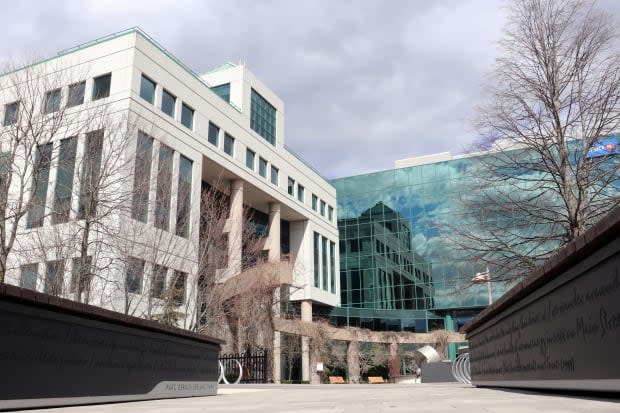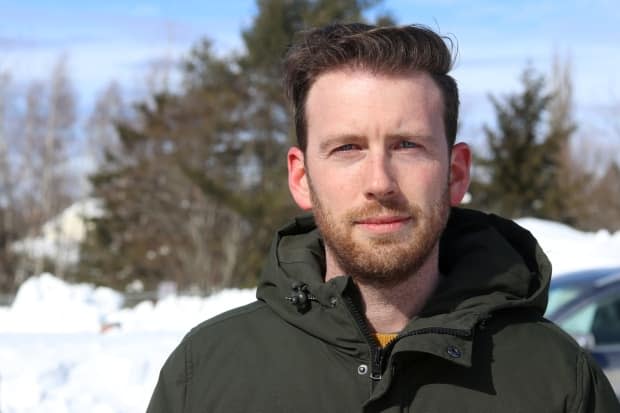Higgs ready to help N.B. cities cope with growth, but fiscal questions remain

Premier Blaine Higgs says his government is ready to help New Brunswick cities cope with a growing housing and homelessness crisis triggered by fast population growth — but he's cagey on whether he'll agree to a major tax overhaul to help pay for it.
Moncton and other cities spent most of 2022 pleading with the provincial government to move faster in adopting new policies and funding models to address the issue.
"If more is needed to solve the problems … we're in," Higgs said in a 2022 year-end interview with CBC News. "We're in because we want to see that we get major improvements."
But the premier, whose government is projecting a $774.4 million budget surplus this year, questioned whether handing over more money is the answer.
Previous poverty-reduction programs didn't eliminate the problem, he argued, and municipalities have seen "equally huge gains in their bottom line, in their revenue stream," thanks to all the growth.

"If you basically take the philosophy that, you know, 'because I have more money, I'm going to spend it,' how often does that actually get spent on something that achieves success?"
Dramatic growth in cities
New Statistics Canada data released in December show New Brunswick added 25,000 new residents — about the population of the city of Dieppe — in the last year.
Growth has been the most dramatic in the largest cities, where the strain on services is testing the provincial-municipal fiscal relationship like never before.
Housing and homelessness are provincial, not municipal, responsibilities. But some city leaders say Higgs has been slow to meet the growing demand for expanded services, forcing them to step in.
"The pressures that have been placed on municipalities have outpaced the additional funds that are required," says Moncton Ward 2 Coun. Charles Léger.
Higgs admitted "it's hard to keep up with what we've seen in the last two years," calling it the biggest spike in the population since Confederation.
"We can only build houses so fast," he said, noting a recent $100 million announcement for hundreds of new social housing units.
In Moncton, the city took the lead on adding to emergency shelter capacity, even though that's technically the province's responsibility.
The two levels of government even got into a dispute about how many homeless people are in the city. Frontline service providers in Moncton estimated 500, more than double the number the province was using.

The situation has become acute at the same time the province is looking at turning over more responsibility for housing to local communities.
The government's white paper on local government reform calls for a new role for regional service commissions developing "a coherent regional vision and plan" in areas such as affordable housing.
In his year-end interview Higgs also floated the idea of a new kind of "governing board" — separate from regional commissions — with provincial and municipal representation to ensure "that the distribution of the funds is reaching the output and the results that they need."
More flexibility needed
The cities have been asking the province to give up some property tax room so they can collect that revenue instead and spend it to address these new challenges.
"We're really, really hoping that that is going to happen in 2023," said Adam Lordon, the mayor of Miramichi and president of the Cities of New Brunswick Association.
University of New Brunswick economist Herb Emery said the current centralized property tax model was designed for a time when the priority was an equal level of services provincewide.
Now, he said, there's clearly a need for more flexibility to address uniquely urban challenges.
"The ongoing battle is how much revenue power do you want to grant to a city instead of the province to deal with these issues?" he said.
"Or do you want the province to take its commitment seriously and give cities the resources to deal with the things that weren't originally accounted for 10 or 15 years ago?"
Asked about downloading property tax capacity to municipalities, Higgs did not respond directly but instead argued the province already provides plenty of funding, including what he estimated to be $13 million to $14 million to non-profit organizations providing services in Moncton.
"Is that really getting the results? Because you know, the problem continues to grow," the premier said.
Léger says Moncton and surrounding communities need closer to $50 million.
He said he'd welcome the city or the regional service commission winning a greater official role on housing and homelessness, but only if the province comes up with a mechanism to ensure it gets more funding.
"I'll take the responsibility but I want to make sure the monies are there to make sure I'm not set up for failure."

Even so, Léger believes the province's policy-making apparatus, long oriented toward New Brunswick's rural character, began shifting its focus to urban issues in the last year.
"The province has now clearly recognized that the problems that are happening are important to our whole province."
One sign of "clear, concrete action" is the placement of two Department of Social Development officials in Moncton to co-ordinate the provincial response, he said.
"I do think we are turning a corner and the services that need to be provided will be provided."
Schools, housing not keeping pace with growth in urban areas
Lordon also sees what he calls a "pivot" in the province's approach to the difficulties created by rapid growth.
"In the last few months, it feels like we broke through to a degree," he said. "We're having conversations that we weren't having before."
Housing and homelessness are just two policy challenges created by the province's unprecedented population growth.
There are almost 1,400 more school-age children than expected this year in the Anglophone East School District alone. That's one or two new schools' worth of kids.
Yet the province's capital budget this year included no announcement of any new schools in the Moncton-Dieppe-Riverview area.
Even in Miramichi, two schools built in the last five years are already full, Lordon said.
The population increase also means more demand for services from health care to public transit, the mayor said.
Earlier this year, Higgs said he didn't want to spend $114.3 million in federal money earmarked for public transit infrastructure. He persuaded Ottawa to allow the funds to be spent elsewhere.
Lordon said students, recent immigrants, temporary foreign workers, minimum-wage workers and seniors all use Miramichi's buses.
"Each of these demographics are increasing at record numbers and are going to continue to increase in the years ahead," he said.
"I hope the premier will have an opportunity to evolve his thinking. … We could certainly use federal support, and provincial, for that matter."

But it's housing and homelessness that will continue to present the biggest challenges in 2023, Lordon said.
"If you had told me a few years ago that in Miramichi, we wouldn't be able to build housing fast enough to house all of the people choosing to come to our community, I would have been a bit skeptical," he said.
"But here we are, and I'm glad that these are the challenges that we're facing."
Léger said if the province falls short in the coming year, it will put at risk the very growth that is creating both opportunities and difficulties.
"People love to focus on the positive stuff and so do I," he said, "but we need a clear mandate on how we're going to address the problems.
"This is the real cornerstone of what we need to address so we have long-term viability, because people won't want to live in a city where they don't feel safe."


